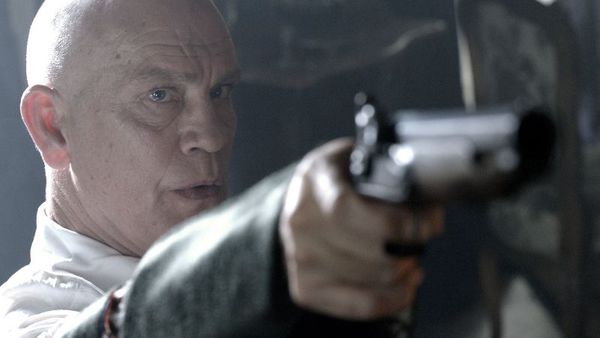Eye For Film >> Movies >> Casanova Variations (2014) Film Review
Casanova Variations
Reviewed by: Jane Fae

To say that Casanova Variations is not for everyone would be serious under-statement. It may be that it is not for anyone not already well versed in the fine detail of all that it meant to be Casanova. Or John Malkovich. Or even Being John Malkovich.
For this is film that flits from past to present, narrative to history, actor to character and back again, with the clarity of the most convoluted of convoluted Dr Who story arcs. With added opera.
The film is based on a chamber-opera play – The Giacomo Variations – which combines dramatic presentation of the last days of Casanova's life with music from the works of Mozart as means to illustrate and illuminate the life of Casanova. Or does it?
Certainly that is the principal on-screen narrative, with action switching at giddy pace between modern day operatic performance and historic narrative, in which Casanova (John Malkovich) receives a visit from Elisa von der Recke (Veronica Ferres), seeking the rights to publish his autobiography. Or is she? Perhaps she is in fact a former lover seeking closure.
Where to begin? It starts, as it continues, with Malkovich musing to himself, as he prepares to play the character of Casanova on stage, that “I need variation. I require variation”. So that's John, Being John revealing something of himself to the audience. Or are those just lines? For they turn up a little later, not on stage, but spoken by Casanova to Erica.
Meanwhile the stage action kicks off with apparent disaster. The lead actor has a fit and medical assistance is called for. A member of the audience volunteers her services, only to discover that this emergency, too, was all part of the play. Trapped in the wings until the interval, she takes advantage of her plight to inform Malkovich that his performance in Dangerous Liaisons was her “sexual awakening” - and to inquire if he is actually gay. Because, you know, one hears such stories on the net!
His response – a gentleman would not answer such a question – closely echoes a line delivered later by the historical Casanova.
The walls keep tumbling down. On-stage action moves to the auditorium, as the audience itself morphs from chic 21st century opera-going set to 18th century and back again. At times, on-stage Casanova is played by Malkovich: at times, the role is voiced by an opera singer, as historic Casanova – or maybe modern-day Malkovich. The distinction is not always clear nor, perhaps, necessary.
Meanwhile, past and present and fact and fiction wind round one another again and again, switching effortlessly, confusingly between one another. Historic characters turn up on-stage in the opera: opera singers shift back to history.
A grand instance of this appears as Erica starts to read about one of Casanova's more perverse couplings in his auto-biographical notes. Cut to Malkovich on-stage about to enact this episode. Except he doesn't: instead, he just lies there besides his objet d'amour and recites the same story that Erica has just begun to read.
The point? Some viewers will find this confusing, irritating and will likely give up on this film long before they reach the halfway point. One reviewer reaches for the obvious metaphor: “John Malkovich”, they suggest, “is the human equivalent of marmite: you either love him or hate him”.
But marmite is altogether too ordinary a metaphor for a thing so complex, so multi-layered. Somewhere buried deep below the post-modern show is a story about Casanova reaching the end of his life, trying desperately to reach resolution. Forgiveness? Not exactly. Understanding perhaps.
The difficulty – his tragedy – is that he is a narcissist. He falls in love, constantly: and when he does so, he believes absolutely that he is, in that moment, in love. And two minutes later, he is out of love. A recurrent image is that of the child's swing: and within that image, that instant, that “world between the rise and fall in which we can stay and never die”.
Erica accuses him of being a romantic “in love with the intensity of feelings, more than the person who arouses them”. In the end, there is no resolution: just a procession of episodes, some dashing, some sordid, some that inspire nothing less than revulsion. Casanova dies. The end.
Or is it? How much of this is about Casanova? How much about Malkovich and his continuing public self-examination? No accident, perhaps, that during the interval, Malkovich – being Malkovich – bumps into Jessica (Tracy-Ann Oberman), who portrays a potential backer for a film version of the play. She tells him: “I can’t believe you thought I’d want to produce this as a movie”. Well, quite.
If you do get past the half hour, this film bears watching again. More than once, because it is so rich in both reference and connection.
One gripe – and this may reflect only a feature specific to the version I viewed - was the lack of subtitles. The music is great but it does help to be able to follow what they are singing about - helps, too, to be able to read French. Failing that, you'll miss one more level of this more than passable film.
Reviewed on: 04 Feb 2018















